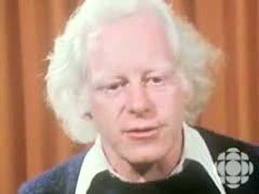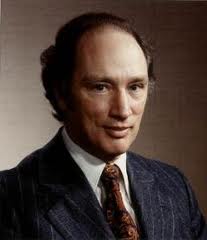
This 1979 report covers the raging debate and political tussle in Quebec between the concept of “sovereignty-association” espoused by Rene Levesque vs. separatism promoted by Pierre Borgault. Two political scientists explain the background to the rise of the Quebecois movement. While many remember the terrorist campaign by the FLQ of the 1960’s, it was the “Quiet Revolution” of those same years that transformed an undereducated, exploited, largely agricultural French speaking population into a political and social force for change. Education gains along with a mounting challenge to the power of the Catholic church led to a more confident society ready to demand its rights and respect for its identity. By 1977 ninety percent of the population of Quebec define themselves as “Quebecois.” For years the Catholic Church had been complicit in denying French speaking Canadians access to the world of business. So when Levesque’s Party Quebecois led a successful campaign to pass Bill 101 making French the official language, it suddenly meant access for the majority of Quebecers to work that was formerly out of reach. While some major Anglo companies pulled up and left Montreal for English speaking Canada, many smaller companies stayed and a transformation began to take place. Some English speaking families eventually chose to send their children to French speaking schools.
“Language is the motor of this movement, but the essence is power,” says Pierre Bourgault, who champions separation from Canada. ” Who has the power? Them or us? It’s a fight for power. We want Quebec to have all the power of a nation.”

But a majority of Quebecers have not voted for separation, instead a growing percentage seem to support Levesque’s idea of sovereignty-association. The discussion gets murky and complicated when it turns to the economic arrangements of either independence or association. But it’s clear that the movement for sovereignty in Quebec has inspired the Canadian political leadership to push for a re-writing of the Canadian constitution to guarantee equal rights for all Canadians and accommodate more provincial autonomy.

The Parti Québécois, which has a separatist platform, won the provincial election in 1994. In 1995, a second referendum on sovereignty was held. The vote was 49.42% “Yes” to 50.58% “No”.
The Parti Québécois was re-elected in 1998, but was defeated by the Liberals in 2003, who have been in power in Quebec since that time.
Federally, separatism has been represented in the Canadian parliament by the Bloc Québécois, a party founded in 1991 which only runs candidates in Quebec. It won the majority of the 75 Quebec seats in the Canadian parliament from 1993 until the 2011 elections, when the New Democratic Party, which shares the social democratic values of the two separatist parties, the Parti Québécois and the Bloc Québécois, but not their separatist aspirations, won 59 seats.